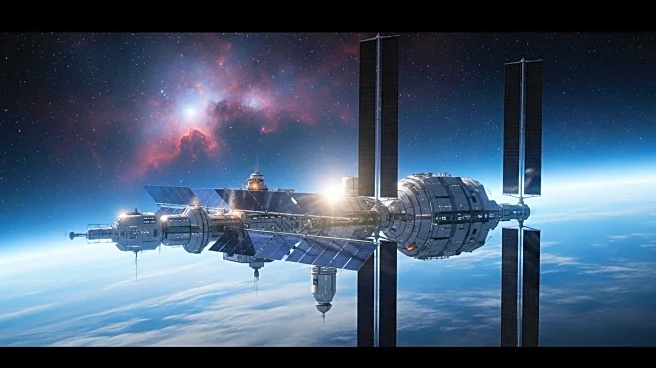What is the story about?
What's Happening?
NASA is preparing for the retirement of the International Space Station (ISS), which has been continuously inhabited since November 2, 2000. The ISS, a collaborative effort primarily between NASA and the Russian Space Agency, has hosted astronauts from 26 countries and has been a hub for scientific research and international cooperation. As the ISS approaches the end of its operational life, NASA is shifting its focus to commercial space stations. Companies like Axiom, VAST, and Voyager are developing their own orbiting stations, with plans to launch in the coming years. This transition aims to maintain a human presence in low Earth orbit while allowing NASA to redirect resources towards lunar and Martian exploration.
Why It's Important?
The transition from the ISS to commercial space stations marks a significant shift in space exploration strategy. By involving private companies, NASA can reduce costs associated with maintaining the ISS, which currently consumes a substantial portion of its budget. This move is expected to stimulate the growth of a commercial space economy, providing opportunities for private industry to innovate and expand human activities in space. The continued presence in low Earth orbit is crucial for ongoing scientific research and technological development, which can have wide-ranging benefits for industries on Earth. Additionally, this shift allows NASA to focus on ambitious goals like returning humans to the Moon and eventually sending missions to Mars.
What's Next?
As NASA phases out the ISS, it will support the development of commercial space stations through contracts and partnerships. Axiom Space, for instance, has already begun sending astronaut crews to the ISS in preparation for its own station. The company plans to attach a module to the ISS before its retirement, which will later detach to form an independent station. Other companies like Voyager and VAST are also progressing with their plans, with launches expected in the next few years. These developments will likely lead to increased space tourism and commercial research opportunities, further integrating space activities into the global economy.
Beyond the Headlines
The shift to commercial space stations raises questions about the future of international cooperation in space. The ISS has been a symbol of peaceful collaboration among nations, and its retirement could alter the dynamics of space diplomacy. Additionally, the involvement of private companies introduces new regulatory and ethical considerations, such as ensuring safety standards and managing space debris. As space becomes more accessible, there will be a need for clear policies to govern activities and protect the space environment for future generations.















